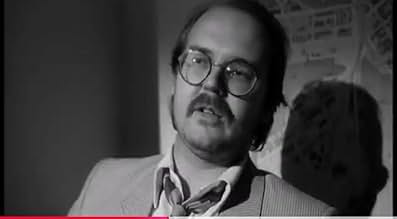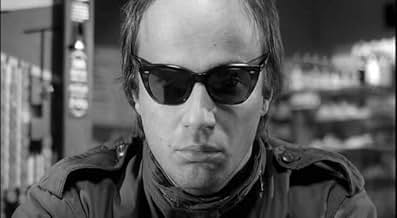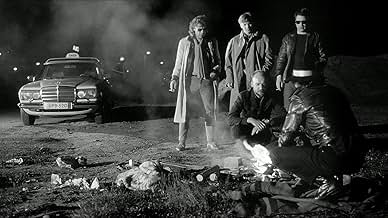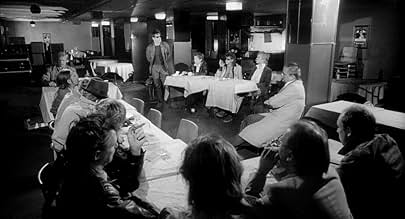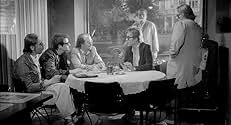AVALIAÇÃO DA IMDb
6,9/10
4,3 mil
SUA AVALIAÇÃO
Adicionar um enredo no seu idiomaAn exodus to a better life in Eira. A group of med - all but one - called Frank, seek refuge from their boring lives in an oasis on the other side of the city, having to overcome obstacles o... Ler tudoAn exodus to a better life in Eira. A group of med - all but one - called Frank, seek refuge from their boring lives in an oasis on the other side of the city, having to overcome obstacles on their way.An exodus to a better life in Eira. A group of med - all but one - called Frank, seek refuge from their boring lives in an oasis on the other side of the city, having to overcome obstacles on their way.
Sakari Kuosmanen
- Frank Armoton
- (as Saku Kuosmanen)
Tuomari Nurmio
- Taksikuski
- (as Hannu Nurmio)
Avaliações em destaque
Aki's second personal feature film has a prototype of the late style, but it is not particularly clear. After thinking about it, I can't find a particularly accurate language to summarize the theme of the film. It seems that it can also make a psychological interpretation. It can even be said to be a cool "Finnish version of mind agents"? Everyone's name is frank, but everyone seems not to be frank. The ideal country they are looking for seems to be illusory. Maybe a lot of music is what AKI really wants to present.
This film, from the beginning of Kaurismäki's career, reminded me, to a certain extent, of another iconic film about the lost illusions of the 60s and 70s generations, The Wretches Are Still Singing, by the Greek Nikos Nikolaidis.
Of course, Nikolaidis's cinematic language is much more caustic and corrosive. Kaurismäki is faithful to his minimalist principles, as a poet of the absurd. But the essential theme is the same: a lost generation, overtaken by events, that searches, in vain, for a meaning in life in the technocracy that emerged from the rubble of the revolution (real or imaginary).
If Nikolaidis is destructive (and he would be even more so in 1983's Sweet Bunch, in which he practically defends urban guerrilla warfare) Kaurismäki is poetic, transforming disillusionment into a chimerical search for the mythical Eira, Holy Grail of aimless knights, survivors of punk nihilism.
An interesting and original work, even for those who already know Kaurismäki's minimal cinematographic language.
Of course, Nikolaidis's cinematic language is much more caustic and corrosive. Kaurismäki is faithful to his minimalist principles, as a poet of the absurd. But the essential theme is the same: a lost generation, overtaken by events, that searches, in vain, for a meaning in life in the technocracy that emerged from the rubble of the revolution (real or imaginary).
If Nikolaidis is destructive (and he would be even more so in 1983's Sweet Bunch, in which he practically defends urban guerrilla warfare) Kaurismäki is poetic, transforming disillusionment into a chimerical search for the mythical Eira, Holy Grail of aimless knights, survivors of punk nihilism.
An interesting and original work, even for those who already know Kaurismäki's minimal cinematographic language.
Aki Kaurismäki's career began with the masterpiece Crime & Punishment. However, instead of making something similar immediately afterwards, he chose to follow it with an unconventional, black and white satire, Calamari Union.
The film begins in a bar, a pivotal place in Kaurismaki's movies. It is here we first meet our sixteen protagonists: fifteen men (including Matti Pellonpää, Kari Väänänen and Sakari Kuosmanen) all named Frank (apparently, the director was too lazy to come up with different names for everyone) and a guy named Pekka (Markku Toikka). These people represent the lowlife of Helsinki and, aware of this fact, they decide to go to Eira, the decent part of the city. The journey is described as if it were perilous, and in fact things will take unexpected turns.
Calamari Union is a strange film, as it doesn't follow the rules of conventional plotting. What we see is rather a series of separate, quite amusing incidents involving the Franks and Pekka, the dry, very Finnish humor being an anticipation of Kaurismäki's musical satire Leningrad Cowboys Go America (speaking of music, there's an interesting use of the song Stand By Me - a year ahead of Rob Reiner's eponymous movie).
This may not be the kind of movie people watch on a regular basis, but once it's been seen, it doesn't escape your memory. Perfect for a "different" cinema experience.
The film begins in a bar, a pivotal place in Kaurismaki's movies. It is here we first meet our sixteen protagonists: fifteen men (including Matti Pellonpää, Kari Väänänen and Sakari Kuosmanen) all named Frank (apparently, the director was too lazy to come up with different names for everyone) and a guy named Pekka (Markku Toikka). These people represent the lowlife of Helsinki and, aware of this fact, they decide to go to Eira, the decent part of the city. The journey is described as if it were perilous, and in fact things will take unexpected turns.
Calamari Union is a strange film, as it doesn't follow the rules of conventional plotting. What we see is rather a series of separate, quite amusing incidents involving the Franks and Pekka, the dry, very Finnish humor being an anticipation of Kaurismäki's musical satire Leningrad Cowboys Go America (speaking of music, there's an interesting use of the song Stand By Me - a year ahead of Rob Reiner's eponymous movie).
This may not be the kind of movie people watch on a regular basis, but once it's been seen, it doesn't escape your memory. Perfect for a "different" cinema experience.
This is the only film I have seen in cinema twice in three days. I really loved it, it being very absurd. 17 Finnish-speaking men all named Frank, and one English-speaking(quite poorly) man named Pekka are on their way to the other side of the town -Eira, the escape from the dirty streets of Helsinki (where the night never seems to end), a task that turns out to be harder than one should expect.
This is the only film Kaurismäki has made either drunk or having a hangover, and he is not satisfied with it, but that shouldn't be a reason not to see it. It is very funny, and you ought to look out for details if you get the chance to see it, one example being a woman walking out from an airport, coming right out on a small street in the city.
Lots of dangerous grins, dark sunglasses, and no problems remembering the characters names. Great!
This is the only film Kaurismäki has made either drunk or having a hangover, and he is not satisfied with it, but that shouldn't be a reason not to see it. It is very funny, and you ought to look out for details if you get the chance to see it, one example being a woman walking out from an airport, coming right out on a small street in the city.
Lots of dangerous grins, dark sunglasses, and no problems remembering the characters names. Great!
Kaurismaki followed on the dour and heavy drama of his debut Crime and Punishment with the often funny, significantly more light-hearted, absurdist fare of Calamari Union. Fifteen guys named Frank and their retarded companion Pekka (who speaks English for some reason) decide to leave their seedy downtown neighborhood and dead-end lives behind and move to the suburb of Eira, on the other side of the city. Eira immediately acquires a quasi-mythic status, equal parts promised land and elysian fields, and their trip through the hostile, soulless city landscape is beset with hardships worthy to a trip filled with such religious allegories.
There's not much of a plot to speak of. The Franks make their way through the city and is every man out for himself. Once in a while they stop to comment on their surroundings, sleep in phone booths, trees and other strange places, offer nuggets of wisdom about vanity, inactivity, time and age, part scathing social critique and part insights into human nature; they also stop to hijack members of the parliament, a hearse, get free rides in a taxi or on top of a car, sleep in a beach or under a table and last but not least, die funny or just plain random deaths.
That is Calamari Union in a nutshell and there lie both its charms and failures. It has the improvised feeling of a freejazz piece - like them, sometimes it works, sometimes it doesn't. It can be inspired, infectiously cool and funny but it can also be meandering and aimless. You take the good with the bad I guess.
There's not much of a plot to speak of. The Franks make their way through the city and is every man out for himself. Once in a while they stop to comment on their surroundings, sleep in phone booths, trees and other strange places, offer nuggets of wisdom about vanity, inactivity, time and age, part scathing social critique and part insights into human nature; they also stop to hijack members of the parliament, a hearse, get free rides in a taxi or on top of a car, sleep in a beach or under a table and last but not least, die funny or just plain random deaths.
That is Calamari Union in a nutshell and there lie both its charms and failures. It has the improvised feeling of a freejazz piece - like them, sometimes it works, sometimes it doesn't. It can be inspired, infectiously cool and funny but it can also be meandering and aimless. You take the good with the bad I guess.
Você sabia?
- CuriosidadesThe first movie ever to include scenes in the Helsinki underground, opened in 1982.
- Erros de gravaçãoThe Director is seen in reflection of Frank's (Sakke Järvenpää) sunglasses in "My friend got sick, can you help us" scene.
- Cenas durante ou pós-créditosThe film has virtually no credits at all. There are no opening credits, and in the end, only the text "Loppu" and the production company's name are seen.
- Versões alternativasAll the scenes are intact, but the title card and opening credits are missing from the 2013 (1.85:1) HD master, which is featured in the Finnish streaming service Yle Areena and subsequent Finnish/international television, DVD and Blu-ray releases. The credits originally appear during the early scenes where the "Frank's" initially leave, walk out and past the Kallio Church (followed by a wider shot of the city of Helsinki) and enter the underground metro station. All credits are intact in the older, pre-2013 television airings and home video releases.
- ConexõesFeatured in Keskiyön auringon kuvat (1987)
- Trilhas sonorasAlkutekstimusiikki
Composed by Aki Kaurismäki
Arranged by Mikko Mattila and Jone Takamäki
Performed by Casablanca Vox and Jone Takamäki
Saxophone: Jone Takamäki
Drums: Kaleva Raittinen
Principais escolhas
Faça login para avaliar e ver a lista de recomendações personalizadas
- How long is Calamari Union?Fornecido pela Alexa
Detalhes
- Tempo de duração1 hora 21 minutos
- Cor
- Mixagem de som
- Proporção
- 1.66 : 1
Contribua para esta página
Sugerir uma alteração ou adicionar conteúdo ausente

Principal brecha
By what name was Calamari Union (1985) officially released in India in English?
Responda


